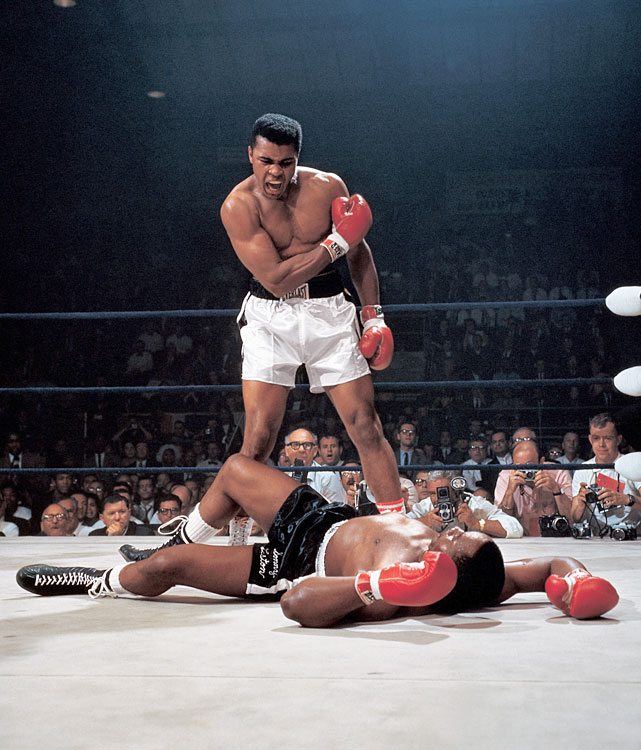How does one sum up the legacy of Muhammad Ali in just one article?
How does one sum up his legacy not just in the boxing ring, but outside of it?
It’s definitely not an easy task.
Because Ali was more than just a boxer. He was more than just a person. He was one of the most inspiring athletes (and people) in the history of mankind. But, like every other human life, the flame has to burn out at some point, and life fades away.
On Friday night, Ali was placed on life support with family by his side at Scottsdale Osborn Medical Center in Phoenix, Arizona. A few hours later, the boxing legend passed away at the age of 74. “After a 32-year battle with Parkinson’s disease, Muhammad Ali has passed away at the age of 74. The three-time World Heavyweight Champion boxer died this evening,” Bob Gunnell, a family spokesman, told NBC News.
“The Ali family would like to thank everyone for their thoughts, prayers, and support and asks for privacy at this time,” Gunnell added.
Immediately following the sudden passing of Ali, a worldwide outpouring of grief and mourning occurred. Millions of tweets and Facebook posts were made to honor the man who had fought and suffered from Parkinson’s disease since 1984, which is a progressive neurological condition that slowly deteriorated his verbal and physical attributes, affecting balance and speech.
Most famously, Ali was trembling while lighting the Olympic torch in 1996 in Atlanta. He also appeared at the 2012 London Olympics, and just like in 1996, he received an astounding ovation.
He was born Cassius Clay on Jan. 17, 1942 in Louisville, Kentucky, to middle-class parents. Ali started boxing when he was just 12 years old, winning Golden Gloves titles before heading to the 1960 Olympics in Rome, where he won a gold medal as a light heavyweight competitor.
In 1964, at the age of 22, Ali knocked out Sonny Liston in the first round (shown above), in what is perhaps the most famous photo in sports history, and one of the most famous photographs of all time.
Ali’s death is “sad, and yet, here was a person who probably did more to transform what people thought about race and religion and about peace, both in the United States and the world,” said Bob Arum, whom was Ali’s promoter in the 1960s and 1970s. “I really believe that he even had more of an impact, because he had been this great boxer, and because he had made this tremendous sacrifice, giving up his career for what he believed in for three and a half years, that he had more of an impact than even Martin Luther King. I really believe that.”
After joining the Nation of Islam in 1967, Ali refused on religious grounds (and total opposition towards the war) to serve in the Vietnam War, and thus was labeled a “draft dodger”, subsequently having his title stripped. In 1971, the Supreme Court overruled the accusation of calling Ali a “draft dodger”. Due to having his boxing license stripped in 1967, Ali did not box from March 1967 to October 1970.
Following his return, however, he had his perhaps most famous bouts against a man who he constantly dehumanized (he later stated he regretted it)… Joe Frazier. The first fight between the two legends occurred on March 8th, 1971, in what became known as the “Fight of the Century”, which Frazier won in 15 rounds via unanimous decision.
On January 28th, 1974, Ali and Frazier fought in “Ali vs. Frazier II” which was won by Ali in 12 rounds via a unanimous decision.
Finally, the last bout between the two fighters came on October 1st, 1975, when the two faced off in “The Thrilla in Manilla”. In the end, Ali won via a TKO (his 38th career total) in the 14th round and officially ending the in-ring feud between the two iconic fighters.
Ali’s last fight was a loss to Larry Holmes on October 2nd, 1980, the only fight in his career in which he lost via TKO.
Outside of the ring, it was his charity and humanitarian work that continued to make Ali not only a household name, but an overall inspiration and hero to millions across the globe. He and his fourth wife Lonnie Ali helped raise over $100 million dollars for Parkinson’s disease research.
He would make as many public appearances as possible, for schools, charity events, and for political honors. Despite the Parkinson’s clearly taking its toll on his health, Ali continued to make the most of his life.
“The Greatest” always said: “Don’t count the days. Make the days count”.
If there is one thing for sure, it’s that Ali made each day count, and it’s sad that there are no more days left.
A funeral service is planned in his hometown of Louisville, Kentucky.
I personally wish to extend my sincerest condolences to the Ali family at this time.


